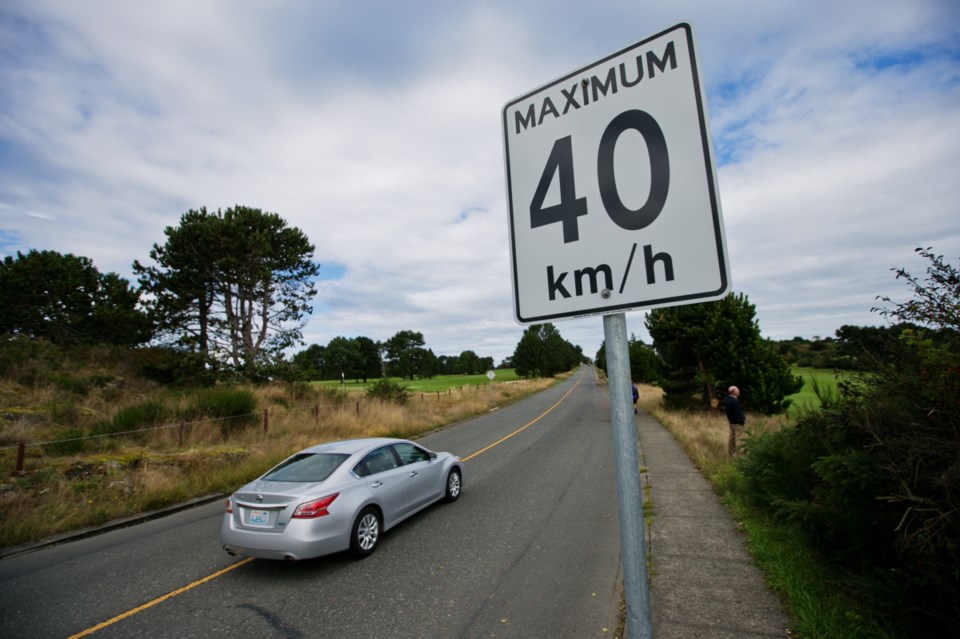VANCOUVER — Victoria councillors Shellie Gudgeon and Ben Isitt are on a mission heading into the Union of B.C. Municipalities convention in Vancouver this week. They want to convince municipal colleagues from around the province that lowering speeds on city streets makes sense.
“We’re going to be on the hustings, so to speak, working the corridors at the convention hall and just having as many conversations with different council members and mayors as we can,” Isitt said.
Victoria has sponsored a resolution calling on the province to amend the Motor Vehicle Act to limit the default speed limit on residential streets to 40 kilometres an hour. Working with the city’s engineering and communications divisions, Gudgeon and Isitt have had 3,000 leaflets printed, outlining their position that lowering the default speed limit would make municipalities safer and more sustainable.
“We’re bringing 3,000 of those suckers over and our plan is to try to distribute [them] to at least half the delegates through one-on-one contact,” Isitt said. “Then the day of the vote, we’ll have one on every delegate’s seat when they enter the hall.”
Isitt said the hope is to dispel some of the misinformation and the fear surrounding the resolution.
Both Isitt and Gudgeon point out that the resolution doesn’t call for lowering the speed limit on all city streets.
“I’m all for raising some limits, too,” said Gudgeon, who drives a Porsche and candidly admits to collecting about three speeding tickets over the past 10 years on Blanshard Street.
“It’s appropriate for the speed limit on Blanshard to be 60 [km/h] north of Hillside or maybe north of Bay. It’s not about stopping people. It’s about safety — safety for cyclists and safety for pedestrians,” she said.
The measure advocated by Victoria’s resolution would lower speed on residential streets to 40 km/h from the current 50 km/h, but save municipalities the expense of posting the speed limit on every residential street. Speed limits on major arterials would remain unchanged or could even be increased.
While Gudgeon predicts that getting support for the resolution at the convention “will be a battle,” she was heartened by new Transportation Minister Todd Stone’s announcement that he has asked his staff to both consider raising some highway speed limits and to look at lower urban speed limits.
“I’m going to be working hard to try to win people over,” she said.
Sidney is expected to share some of the spotlight during the resolutions session, with its call for a change the Motor Vehicle Act to license motorized scooters and their operators.
The resolution (endorsed by the UBCM resolutions committee and amended to include motorized wheelchairs) has garnered national media attention and a backlash from disability advocates.
Sidney Mayor Larry Cross said he never expected all the attention from the media.
“But I’m happy it did,” Cross said.
“It’s an issue that really needs to be examined, and there has been a lot of really good discussion around it. We’ve heard from people who are really upset and decidedly opposed, and I don’t think they really understood what our purpose was,” he said.
“But on the other side, we’ve had a lot of support and a lot of excellent suggestions on how to move forward on it.”
The original recommendation for the resolution came from advisory committees, and the intent was simply to provide safety for both scooter users and others on sidewalks, he said.
In hindsight, Cross said, the idea of licensing scooters and their operators is probably too complex, and the matter might better be dealt with via guidelines or suggested regulations.
“Our goal is to make Sidney sidewalks safe for both the scooter users and residents. And also, we’d like to see it spread through the country as well, because this is a growing issue.
“If you look at the demographics that are developing in this country, this is going to be a very significant issue for almost every community in Canada,” Cross said.



